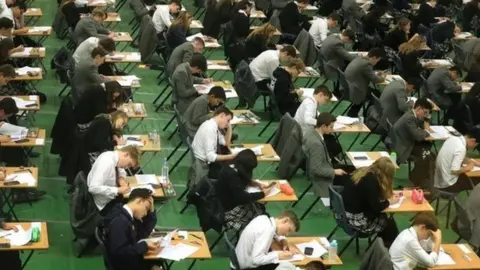Wales urged to scrap GCSE exams in favour of assessments
 PA
PAThe Welsh exams regulator is recommending GCSE exams be scrapped in favour of assessments next summer, but that some A-level papers be kept.
Qualifications Wales said using class-based tests would be the fairest option for pupils while offering certainty in uncertain times.
The Scottish government has taken a similar move, only keeping exams for Highers - its A-level equivalent.
In England, the government is insisting all national exams will go ahead.
But its exams regulator, Ofqual, is consulting on how GCSE and A-level exams can be modified so they are held fairly next summer.
The Westminster government is planning to hold English exams three weeks later than usual over a condensed period. However, further changes and contingency plans for exams are expected to be announced within weeks.
England 'running out clock'
The National Education Union said: "Where Scotland and Wales lead the way, England is once again running out the clock with plans for a three-week delay to 2021 exams and very little else."
A second review for Wales, based on interviews with many pupils affected by the disarray of 2020 exams, calls for all GCSE, AS-Levels and A-Level exams to be axed entirely.
The Welsh Independent Review Panel wants grades to be awarded on the basis of class-based tests and for fairness to pupils and their needs to be the priority.
Wales's education minister Kirsty Williams will now consider the issue and is set to announce a decision on 10 November.
'Alarm bells'
Pupils across the UK have lost months of learning due to last spring's school shutdown, and many have missed periods of schooling this term because of Covid-related absences.
Teachers' unions and head teachers have called for the Westminster government to draw up a "plan B", to account for this in case exams cannot take place.
A new report from the Education Policy Institute highlighted varying attendance rates across the UK during the pandemic.
The think tank's analysis shows that in areas with the highest rates of the virus in the UK, such as the north-west of England, as many as four in 10 secondary pupils were unable to attend school during October.
In contrast, other areas have seen almost all their pupils attend school in person.
Association of School and College Leaders' general secretary Geoff Barton said the attendance figures statistics in the EPI report should "ring alarm bells" for ministers.
"There is no way that it can be business as normal if a third of pupils were unable to attend school in some areas of the country, while in other areas attendance is over 90%.
"If the government wants to save next year's exams series, and stop it falling into complete disarray, it has to stop shilly-shallying and get a grip of this matter."
He reiterated calls for students to be given more choices in exam papers and called for workable back-up plans.
Rich and poor
Research also suggests that in the first half of the autumn term, the most deprived areas in the UK were more likely to have seen lower pupil attendance.
In October, attendance levels at English secondary schools were as low as 61% in Knowsley, 67% in Liverpool and 70% in Rochdale.
Wales attendance levels varied from 81% in Merthyr Tydfil and Denbighshire to 93% in Ceredigion and 94% in Monmouthshire.
Under the Qualifications Wales proposal, grades for GCSEs and AS Levels would be awarded on the basis of coursework and a set of common assessments which could be arranged flexibly by schools and colleges.
For A levels, learners would need to sit one exam paper per subject in addition to coursework and set tasks.
And pupils who are ill or self-isolating would have a back-up opportunity to sit the exam instead.
A Department for Education spokesman said it was engaging widely with the education sector but that exams were the fairest way of judging a student's performance, insisting that English exams would go ahead.
He added: "Over the coming weeks we will jointly identify any risks to exams and the measures needed to address potential disruption, with fairness to students continuing to be our priority,"
